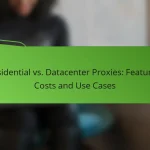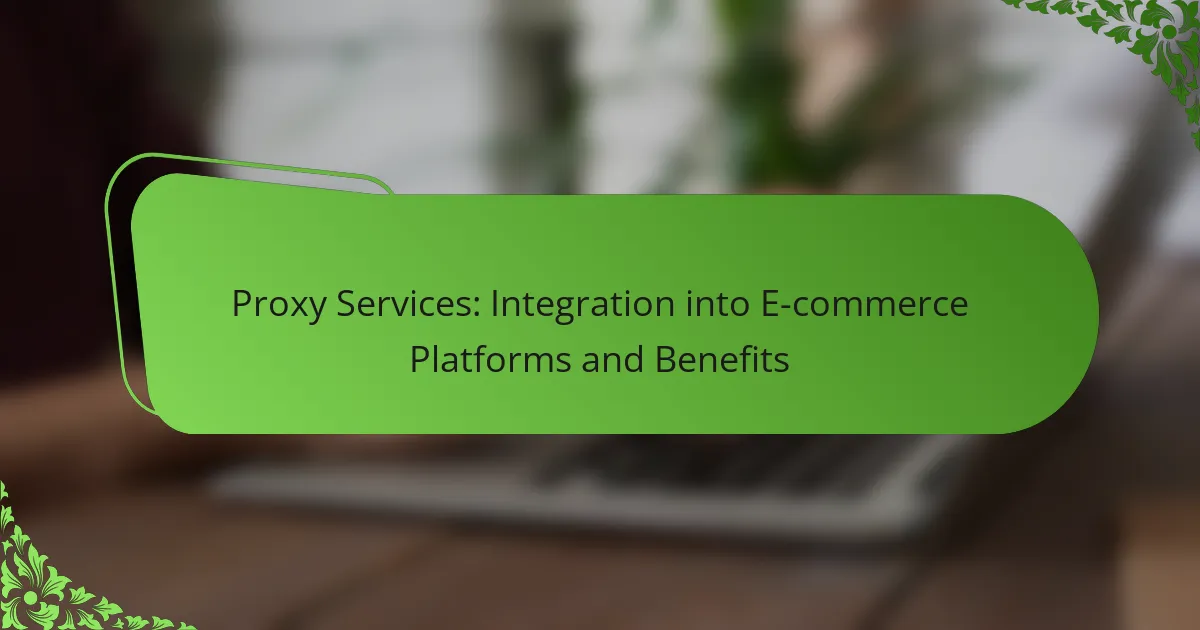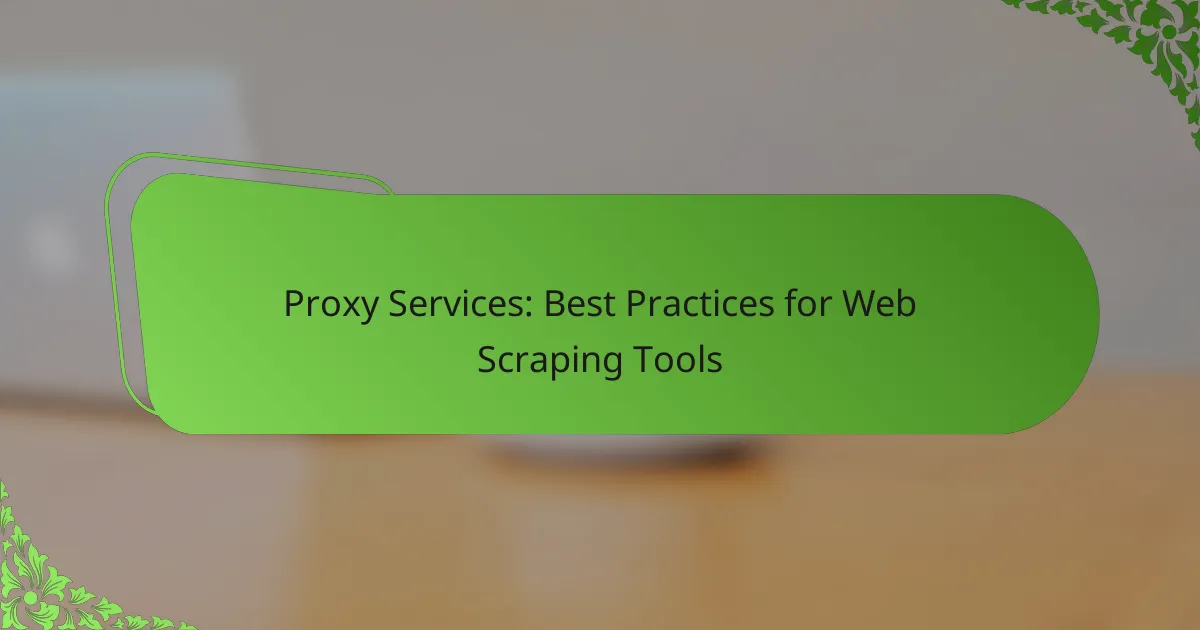Proxy services play a crucial role in optimizing SEO tool integration by enabling efficient data collection and access to geographically restricted content. By leveraging these services, businesses can enhance their SEO strategies with valuable insights derived from comprehensive data analysis. Selecting the right proxy provider can significantly improve web scraping capabilities and overall site performance.
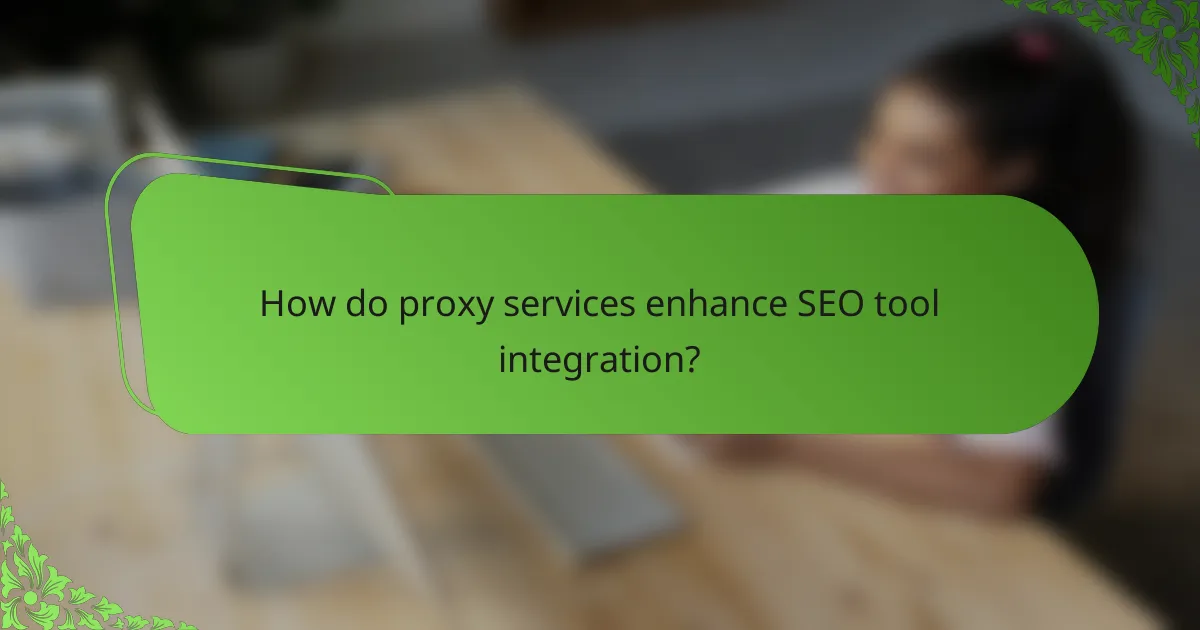
How do proxy services enhance SEO tool integration?
Proxy services significantly enhance SEO tool integration by allowing users to gather data more efficiently and access content that may be restricted based on geographic location. By utilizing proxies, businesses can improve their data collection processes and gain insights that drive better SEO strategies.
Improved data scraping efficiency
Proxy services boost data scraping efficiency by distributing requests across multiple IP addresses, reducing the likelihood of being blocked by target websites. This enables more extensive data collection in shorter time frames, which is crucial for competitive analysis and keyword research.
When using proxies for scraping, consider rotating IPs frequently and employing a mix of residential and data center proxies. This approach helps maintain anonymity and minimizes the risk of detection, allowing for smoother operations.
Access to geo-targeted content
With proxy services, users can access geo-targeted content that is often restricted to specific regions. This is particularly useful for businesses looking to analyze local competitors or understand regional market trends.
For example, if a company wants to evaluate search engine results in Germany, using a German proxy allows them to see localized results that would not be visible from other countries. This access can inform targeted marketing strategies and content localization efforts.
Bypassing IP restrictions
Proxy services are essential for bypassing IP restrictions imposed by many websites. By masking the user’s original IP address, proxies allow for seamless access to content that might otherwise be blocked or limited based on geographic location.
To effectively bypass IP restrictions, choose a reliable proxy provider that offers a large pool of IP addresses. This ensures that users can rotate their IPs frequently, reducing the chances of encountering blocks and maintaining uninterrupted access to necessary data.

What are the best proxy services for SEO tools?
The best proxy services for SEO tools provide reliable, fast, and secure connections that enhance web scraping and data collection. Key players in this space include Bright Data, Smartproxy, and Oxylabs, each offering unique features tailored for SEO needs.
Bright Data (formerly Luminati)
Bright Data is renowned for its extensive proxy network, which includes millions of residential IPs across the globe. This vast pool allows users to bypass geo-restrictions and access localized content, making it ideal for SEO tasks that require regional data.
When using Bright Data, consider its pricing structure, which can be based on bandwidth or the number of IPs used. This flexibility can accommodate various project sizes, but users should monitor usage to avoid unexpected costs.
Smartproxy
Smartproxy offers a user-friendly interface and a robust network of over 40 million residential IPs. It is particularly favored for its affordable pricing and ease of integration with popular SEO tools, making it accessible for both beginners and seasoned professionals.
Smartproxy’s features include session control and rotating proxies, which can enhance scraping efficiency. Users should take advantage of the free trial to test its capabilities before committing to a subscription.
Oxylabs
Oxylabs is a premium proxy service known for its high success rates and exceptional customer support. With a focus on enterprise solutions, it provides access to a large pool of residential and datacenter proxies, making it suitable for extensive SEO campaigns.
While Oxylabs may come at a higher price point, its reliability and speed can justify the investment for businesses that require consistent and efficient data collection. Users should evaluate their specific needs to determine if the cost aligns with their SEO objectives.

How to choose the right proxy service for SEO?
Choosing the right proxy service for SEO involves assessing key factors such as bandwidth, speed, pricing models, and customer support. A well-selected proxy can enhance your SEO efforts by providing reliable access to data and improving your site’s performance.
Consider bandwidth and speed
Bandwidth and speed are crucial when selecting a proxy service for SEO. High bandwidth ensures that you can handle multiple requests simultaneously without throttling, while speed affects how quickly you can scrape data or perform actions. Aim for services that offer low latency, ideally in the low tens of milliseconds, to optimize your SEO tasks.
Evaluate the proxy’s performance during peak usage times to ensure consistent results. Some services provide speed tests or performance metrics, which can help you make an informed decision.
Evaluate pricing models
Pricing models for proxy services can vary significantly, so it’s essential to choose one that aligns with your budget and usage needs. Common models include pay-as-you-go, monthly subscriptions, and tiered pricing based on bandwidth usage. Compare these options to find the best fit for your SEO strategy.
Consider the potential return on investment (ROI) of the proxy service. A slightly higher-priced option with better performance and reliability may yield better results than a cheaper alternative that falls short.
Check customer support options
Reliable customer support is vital when using a proxy service for SEO. Look for providers that offer 24/7 support through various channels, such as live chat, email, or phone. Quick response times can help resolve issues that may impact your SEO efforts.
Additionally, review customer feedback and testimonials to gauge the quality of support provided. A service with a reputation for excellent customer care can save you time and frustration in the long run.
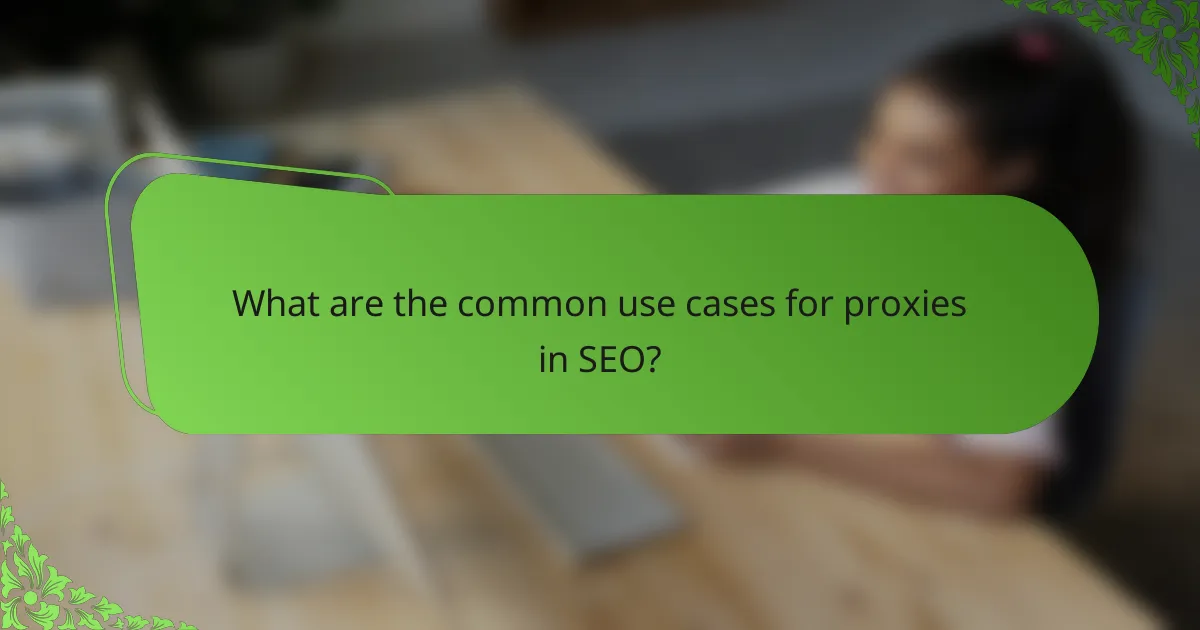
What are the common use cases for proxies in SEO?
Proxies are essential tools in SEO, primarily used for tasks that require anonymity and data gathering without restrictions. They enable users to perform activities like competitor analysis, keyword research, and web scraping efficiently and securely.
Competitor analysis
Proxies facilitate competitor analysis by allowing SEO professionals to gather data from competitors’ websites without revealing their identity. This helps in understanding competitors’ strategies, such as their backlink profiles and keyword usage.
When using proxies for competitor analysis, consider rotating IP addresses to avoid detection and potential blocking. Tools like SEMrush or Ahrefs can be integrated with proxies to enhance data collection and analysis.
Keyword research
Proxies are useful in keyword research as they enable users to access localized search results that reflect different geographic areas. This is crucial for understanding how keywords perform in various markets.
Utilizing proxies can help bypass search engine restrictions and provide a broader view of keyword trends. It’s advisable to use high-quality proxies to ensure faster response times and more accurate data.
Web scraping for content aggregation
Web scraping with proxies allows SEO experts to collect large volumes of data from multiple sources without being blocked. This is particularly useful for aggregating content from various websites to analyze trends and gather insights.
When scraping, ensure compliance with the target site’s terms of service to avoid legal issues. Using rotating proxies can help maintain anonymity and reduce the risk of being banned while scraping data.
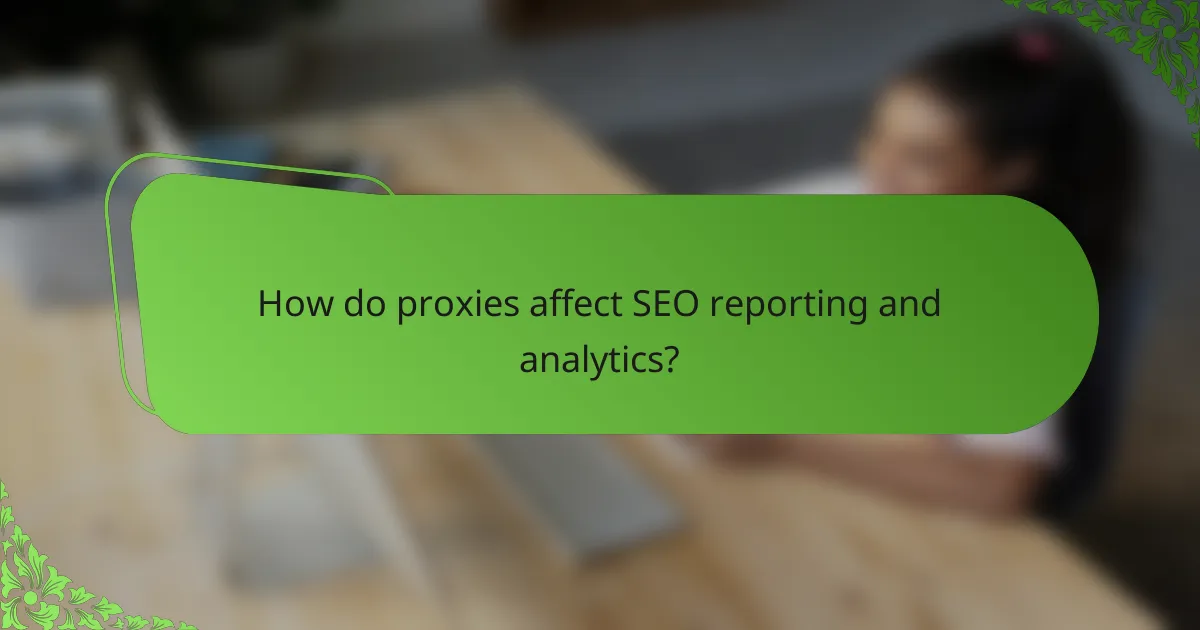
How do proxies affect SEO reporting and analytics?
Proxies significantly enhance SEO reporting and analytics by allowing users to gather data without geographical restrictions and avoid IP bans. They enable more accurate insights into search engine performance and user behavior across different regions.
Enhanced accuracy in data collection
Using proxies for data collection helps eliminate biases that can arise from a single IP address. By rotating IPs and simulating requests from various locations, businesses can gather a more representative dataset of search engine results and user interactions.
For instance, if a company is targeting multiple countries, proxies can provide localized search results that reflect the actual user experience in those regions. This leads to better-informed decisions regarding content strategy and keyword targeting.
Improved tracking of SERP positions
Proxies facilitate more reliable tracking of Search Engine Results Page (SERP) positions by allowing users to check rankings from different locations. This is crucial for businesses that operate in multiple markets, as SERP rankings can vary significantly based on geographic location.
To effectively track SERP positions, it is advisable to use a combination of residential and data center proxies. Residential proxies often yield more accurate results since they mimic real user behavior, while data center proxies can be used for bulk checks at a lower cost.
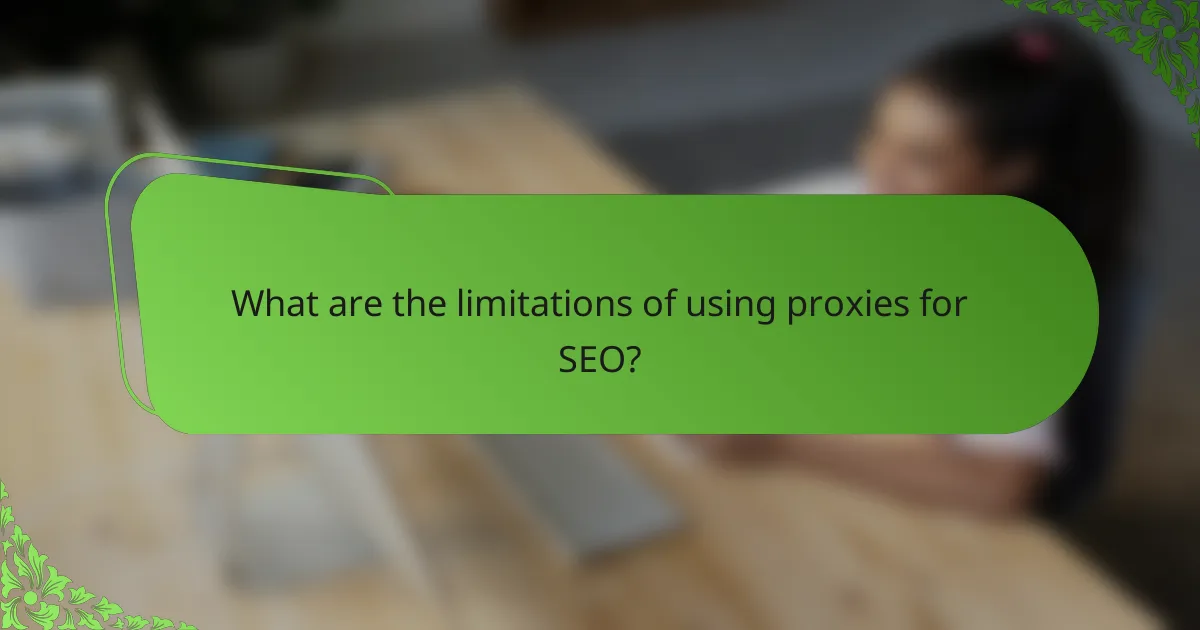
What are the limitations of using proxies for SEO?
Using proxies for SEO can introduce several limitations that may hinder effectiveness. Key issues include the risk of IP bans, potential slowdowns, and the need for constant management to ensure reliability.
Potential for IP bans
One significant limitation of using proxies in SEO is the potential for IP bans. When a proxy IP is used excessively or for scraping, websites may detect unusual activity and block that IP address. This can disrupt SEO efforts and lead to lost access to valuable data.
To mitigate the risk of IP bans, it’s essential to rotate proxies frequently and use residential IPs rather than data center ones. Residential IPs are less likely to be flagged as suspicious, making them a safer choice for web scraping and data collection.
Additionally, implementing rate limiting can help avoid triggering bans. Setting a cap on requests per minute can keep your activities under the radar while still gathering necessary information for SEO purposes.
